Disclosure: The Graduate Samaritan is a free independent blog supported by its readers; this post may contain affiliate links that may earn a tiny commission to help the blog sustain itself, thank you for supporting this independent blog! (full disclaimer here)
Finding an internship can feel overwhelming, especially if you have no prior experience. But don’t worry—this guide will help you navigate the process effectively and land a valuable opportunity.
Whether you’re aiming for a role with a multinational company or a small-medium enterprise (SME), we’ve got you covered.
Let’s dive into the process step-by-step.
Types of Internships: Big Companies vs. SMEs
When searching for internships, you’ll typically encounter two types: those with large corporations or multinationals and those with smaller or medium-sized enterprises (SMEs).
Many students focus exclusively on large companies, drawn by their reputations and perceived career growth opportunities. But is this always the best approach? Not necessarily.
Large companies often have highly competitive application processes, which can leave many students feeling disheartened. SMEs, on the other hand, offer fantastic opportunities and a more straightforward (and human!) application process.
In this guide, we’ll focus on securing internships with SMEs, though many of the tips apply to both types.
Internship Application Processes
Large Companies and Multinationals
The application process for large companies can be rigorous and time-consuming. Typically, it involves:
- Psychometric Tests: These include reasoning and numerical tests.
- Video Recorded Q&A: A chance to showcase your personality and skills.
- Interviews and Assessments: Successful candidates may face multiple interviews and an assessment centre stage before the final decision is made.
If you don’t succeed, you often have to wait months before reapplying. While challenging, applying to these roles can teach you invaluable skills for graduate job applications.
(p.n. We have gone through how to pass psychometric tests for internships & graduate jobs on a separate post)
Small/Medium Enterprises (SMEs)
The process for SMEs is generally faster and less automated. After submitting your CV and cover letter, you may be invited for an informal call, followed by a face-to-face or online interview.
The focus is on a personal connection rather than ticking boxes on an automated system.
Why Are Internships Useful?
Internships are a fantastic way to enrich your CV, gain work experience, and expand your professional network. Many companies offer graduate roles to their interns, making it a stepping stone to a full-time job.
Additionally, internships allow you to apply what you’re learning in university to real-world situations, helping you grasp concepts more effectively.
Are Small Company Internships Worth It?
Absolutely! Internships with SMEs offer a unique experience. Unlike large corporations where you may focus on a single department, SMEs allow you to work across multiple areas, giving you a well-rounded understanding of the business.
Plus, the close-knit work environment fosters stronger professional relationships and networking opportunities.
Can You Get an Internship Without Experience?
Yes, you can! Internships are designed to help you gain experience. Employers often value transferable skills over direct experience.
For example, group projects at university demonstrate teamwork, while meeting deadlines shows time management. Highlight these skills in your CV and interviews to stand out.
Skills to Develop for Internships
Technical skills can set you apart. Familiarity with tools like Microsoft Office, data analysis software, or even programming languages like Python can make a big difference. Check if your university offers free courses to help you build these skills.
Step-by-Step Guide to Finding an Internship
1. Research Opportunities in Advance
You should begin your search early, ideally a few months before the typical internship application season.
Explore job boards, university career portals, and LinkedIn to identify companies offering internships. Websites like Indeed, RateMyPlacement, and Bright Network regularly post internship opportunities.
Set up job alerts to stay informed about new postings that match your criteria. Pay particular attention to companies that have partnerships with your university or have previously hired students for internships.
Early research allows you to prepare better applications and gives you a competitive edge.
Additionally, make use of resources like Glassdoor and company websites to understand their values, culture, and the type of interns they look for. This knowledge will prove valuable when you write your cover letter or during interviews.
🎧 Audible Free Trial – The Ultimate Study Hack!
- 📚 Listen to Textbooks & Study Guides anytime, anywhere.
- 🧠 Boost Focus with expert knowledge and productivity books.
- 🎧 Relax & Unwind with bestselling audiobooks after classes.
- 🔥 1 Free Audiobook Every Month with your membership!
2. Make a Targeted List of Companies
Creating a list of 3-5 companies you’d like to intern with helps you focus your energy and customize your applications effectively.
When making your list, consider factors like the company’s industry, location, and alignment with your career goals.
Research these companies thoroughly, looking into their recent projects, achievements, and areas of expertise. Use this information to tailor your CV and cover letter.
A targeted approach increases your chances of standing out among generic applications!
3. Attend Career Events
You’ll find career fairs, webinars, and conferences incredibly valuable for meeting potential employers and learning about internship opportunities.
These events allow you to interact directly with recruiters, gain insights into company expectations, and make a positive impression.
When attending, dress professionally and prepare questions in advance. For example, ask recruiters about their company culture or what qualities they value most in interns.
Taking notes during these events will help you personalize your applications later. Following up with the professionals you meet, either via email or LinkedIn, shows initiative and keeps you on their radar.
4. Build Your Network
Networking is key to uncovering hidden internship opportunities. You should connect with professors, alumni, and professionals in your field of interest.
Reach out to them on LinkedIn with a friendly message explaining your goals and why you’re interested in their work.
If you attend any career events or industry talks, introduce yourself to the speakers and representatives. Share your interests and ask for advice.
Building genuine connections can lead to valuable mentorship and even referrals for internships.
Don’t forget to stay active on LinkedIn by sharing relevant articles or commenting on posts; this keeps you visible to your network.
(p.n. We have explained how to make a good student LinkedIn profile on a separate post)
5. Develop Technical Skills
As you research companies, identify the technical skills they value most. For example, if a company focuses on digital marketing, you might learn tools like Google Analytics or Canva. If they specialize in data analysis, consider learning Excel or Python.
Many universities offer free workshops, and platforms like Coursera and LinkedIn Learning have affordable (and free) courses. Highlighting these technical skills on your CV demonstrates that you’ve taken initiative to prepare for the role.
Additionally, practice soft skills such as communication and problem-solving. These are equally important and can set you apart in interviews.
6. Craft a Standout CV and Cover Letter
Your CV should clearly showcase your education, skills, and relevant experiences. Use action verbs like “coordinated,” “analysed,” and “designed” to describe your achievements. Keep it concise—ideally one page.
In your cover letter, address the recruiter directly if possible. Begin by expressing your enthusiasm for the role and mention any specific events or company research that inspired you to apply.
Use examples to demonstrate how your skills and experiences align with the company’s needs. Tailoring each cover letter takes time but greatly increases your chances of getting noticed!
7. Apply Strategically
When applying, quality matters more than quantity. Focus on submitting well-researched and tailored applications rather than sending generic ones to dozens of companies. Double-check your CV and cover letter for errors before submitting them.
You should also track your applications in a spreadsheet or a log. Include details like the company name, role, submission date, and follow-up reminders.
If you haven’t heard back within a couple of weeks, send a polite follow-up email expressing continued interest. Persistence shows your dedication and can make a positive impression.
(Bonus paragraph) The Best Student Discount! 💸
Want to save money and enjoy exclusive perks? Unlock big savings with Amazon Prime Student, you can get 6 months FREE—and that’s just the beginning! Here’s what you’ll get with your free trial:
- 🚚 Free Next-Day Delivery on all your essentials—because who doesn’t love fast shipping?
- 🎬 Amazon Prime Video: Stream the latest films, TV shows, documentaries, and even live sports events.
- 🎶 Prime Music: Listen to ad-free music, playlists, and podcasts to stay focused while studying.
- 🎓 Student-Exclusive Offers: Get discounts on uni essentials, textbooks, and more.
And, if you love it (which you will), you can keep your Prime membership at half price until you graduate! 🎓
Ready to start? Follow this quick step-by-step guide to set up your Amazon Prime Student account:
- Visit the official Amazon Prime Student, landing page.
- Click on “Start Your 6-Month Trial” and then hit “Try Prime Student”.
- Sign in if you already have an account, or create one quickly.
- Enter your university email address (ending with .ac.uk).
- Provide your expected graduation year.
- Add your payment details (don’t worry, the first 6 months are totally FREE!).
- Verify your email (Amazon will send a confirmation to your uni address).
- Enjoy your Prime perks!
Don’t miss out on these incredible benefits—sign up today and get your free 6 months of Amazon Prime Student now!
Conclusion, How To Find an Internship
Finding an internship in the UK might seem daunting, but with a strategic approach, it’s entirely achievable—even without prior experience.
By researching opportunities, networking, and building relevant skills, you can create your own opportunities and land the perfect role.
Good luck on your internship journey!
Frequently Asked Questions (FAQ)
1. Can I get an internship without any work experience?
Yes, you can! Many internships are designed for students and freshers without prior experience. Highlight your transferable skills, such as teamwork, problem-solving, and time management, to make a strong impression.
2. When should I start applying for internships?
It’s best to start your search early, around 3-6 months before the desired start date. Some large companies have application deadlines well in advance, while SMEs may have shorter timelines.
3. What should I include in my CV for an internship?
Focus on your education, transferable skills, and any relevant projects or extracurricular activities. Use action verbs to describe your accomplishments and keep your CV concise—preferably one page.
4. How do I prepare for an internship interview?
Research the company thoroughly, practice common interview questions, and prepare examples that demonstrate your skills and achievements. Don’t forget to ask insightful questions about the role and company during the interview.
5. Are internships with SMEs as valuable as those with big companies?
Absolutely! Interning with an SME can offer hands-on experience across multiple departments, closer mentorship, and opportunities to make a significant impact within the organization.
6. How can I improve my chances of getting an internship?
Networking is key. Attend career events, connect with professionals on LinkedIn, and leverage university resources. Additionally, tailor your CV and cover letter for each application and showcase relevant skills.
7. What technical skills should I focus on for internships?
This depends on your field. Common skills include proficiency in Microsoft Office, data analysis tools, programming languages like Python, or design tools like Canva. Check internship postings for specific requirements.
🎓 University Essentials – Everything You Need for Uni
Did you know? We’ve put together tailored student essential lists to help you through every aspect of university life!
- 📝 Student essentials: Everything you’ll need to stay prepared, productive, and comfortable during a typical Uni day.
- 💡 Accommodation essentials: Make your space feel like home (and don’t forget the stuff everyone forgets!).
- 🖥️ Study from home essentials: Tools and tips to create a distraction-free, efficient study setup.
- 🥘 Kitchen essentials: From budget-friendly basics to smart cooking tools that make life easier.
- 🎧 Coolest gadgets for university: Level up your uni experience with tech and tools students actually use.





